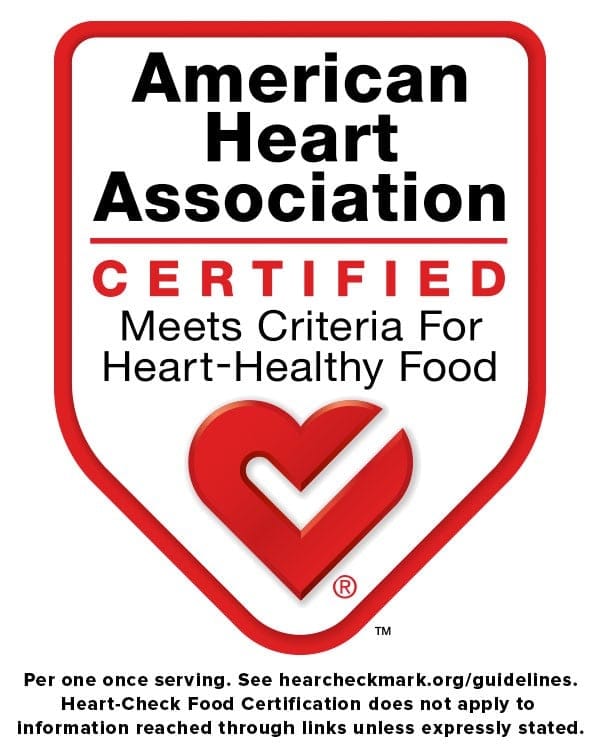Walnuts are a heart-healthy food, certified through the American Heart Association’s Heart-Check program.
The Heart-Check mark easily identifies foods that meet the nutritional standards set by the American Heart Association and provides consumers a quick and reliable way to identify heart-healthy foods.
Heart disease is the leading cause of death for both men and women in the U.S.1 The disease process can start early in life and is influenced over time by lifestyle behaviors including poor nutrition. The Heart-Check mark can help consumers take a step in the right direction in making good food choices. “Eating a handful of heart-healthy walnuts a day is a delicious way to add important nutrients to your diet ,” says Michael Roizen, M.D., Chief Wellness Officer Wellness Institute Cleveland Clinic. “Walnuts offer vitamins, fiber, protein and the only nut providing a significant amount of the plant based omega-3 fatty acid alpha-linolenic acid (ALA)2. ” In fact, some of the most popular nuts on grocery store shelves do not contain any ALA.
There is a strong body of scientific research on walnuts, which began in 1993 with the landmark Loma Linda University study conducted by Dr. Joan Sabaté Chair and Professor of the Department of Nutrition at the School of Public Health, showing walnuts lower LDL ‘bad’ cholesterol by as much as 16 percent. Considering the California Walnut Commission has supported more than 40 published studies on heart health, Dr. Sabaté believes that “the strength of research on walnuts makes them an essential food for heart patients.”
The heart health benefits of walnuts have been studied at world-renowned institutions including Harvard, Penn State and Yale Universities and Beth Israel Deaconess Medical Center. The research substantiating the specific benefit of consuming walnuts as part of a heart-healthy diet in reducing the risk of heart disease is so strong that in 2004 the U.S. Food and Drug Administration (FDA) granted walnuts one of the first qualified health claims for a whole food3.
The American Heart Association’s Heart-Check mark is a credible reference and an icon that consumers trust. Dr. Rachel Johnson, Ph.D., R.D., the Bickford Green and Gold Professor of Nutrition at the University of Vermont and an American Heart Association spokesperson said, “We know that consumers have relied on the American Heart Association’s Heart-Check mark to easily identify heart-healthy foods for more than 15 years. Adding nuts, fish and other foods that are rich sources of good fats, monounsaturated and polyunsaturated fats, enhances the program and gives more healthy options consumers can choose with the same trust factor.”
Dr. Penny Kris-Etherton, distinguished professor of nutrition at Penn State University believes “the Heart-Check mark on walnuts is an important step forward in our thinking about how to eat heart healthy. Emphasizing good fats is important and walnuts are loaded with good fats in the form of polyunsaturated fatty acids.” She thinks “unsalted walnuts are nutrient-dense and can easily fit in a heart healthy diet.”
Get started today with this collection of recipes certified by the American Heart Association’s® Heart-Check Recipe Certification Program.
References:
- CDC. Heart Disease Facts. https://www.cdc.gov/heartdisease/facts.htm. Accessed January 2017.
- One ounce of walnuts provides 18g of total fat, 2.5g of monounsaturated fat, 13 g of polyunsaturated fat, including 2.5 grams of alpha linolenic acid, the plant based omega-3; 2g of fiber; 4g of protein.
- Supportive but not conclusive research shows that eating 1.5 ounces per day of walnuts, as part of a low saturated fat and low cholesterol diet and not resulting in increased caloric intake, may reduce the risk of coronary heart disease.

